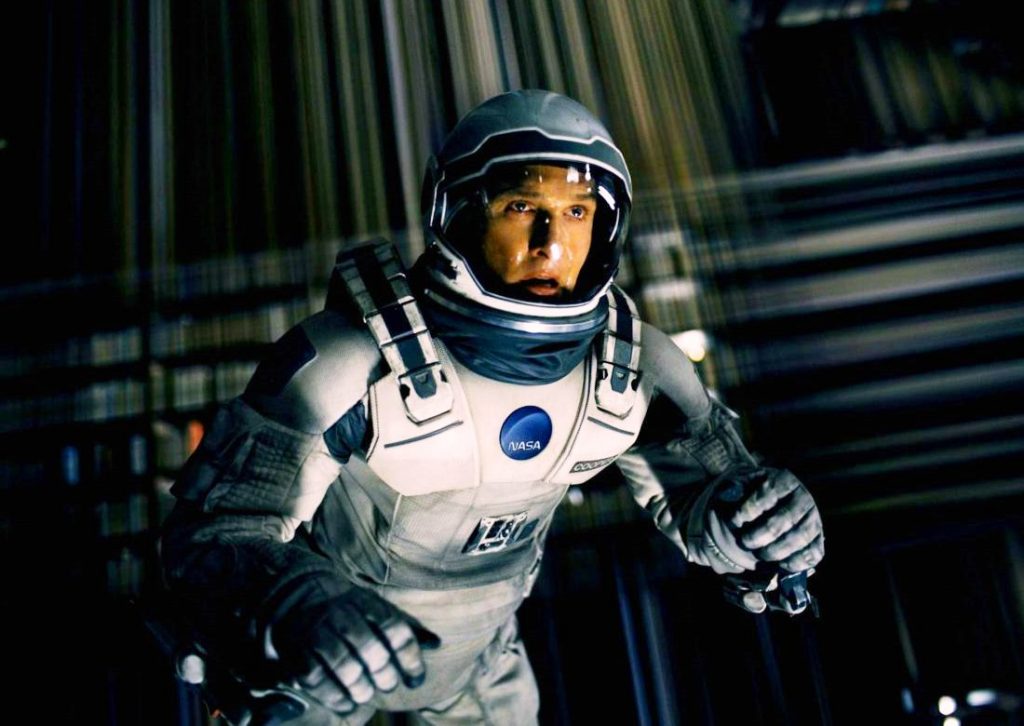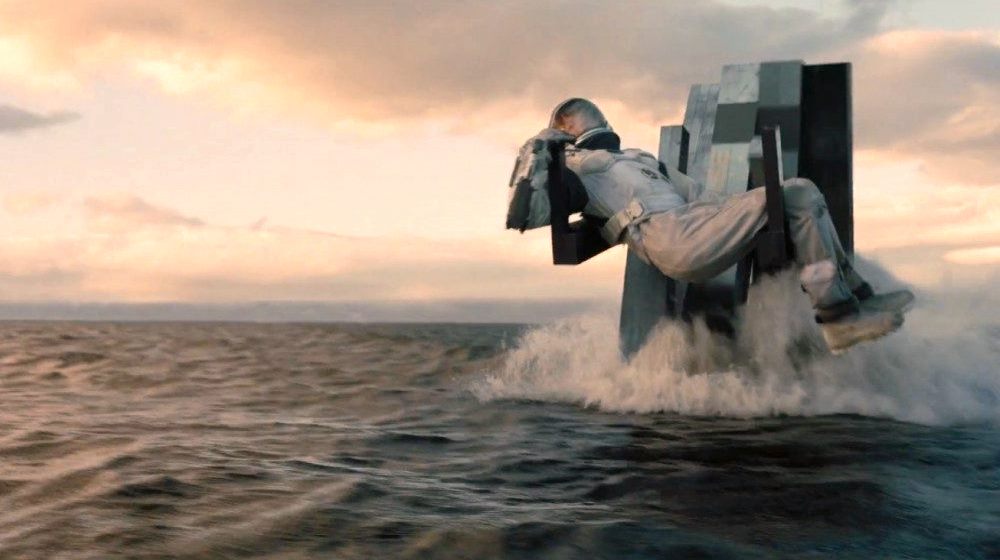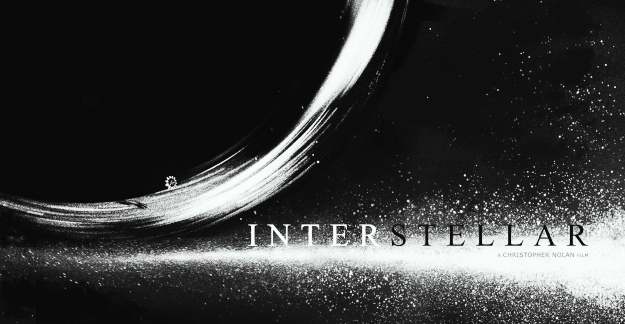
“Interstellar” in 2014 was a momentous occasion before walking into the theater based on anticipation alone. You’d have to be blind not to see that while it was happening (in the second half in particular) it had spectacle and a vision, as if imagined out of Christopher Nolan’s childlike space fantasies as well as hallucinations. It also had nagging deficiencies, it seemed, like perfunctory dialogue and preoccupation with ghosts in the first half hour. It had functional textbook shots intermixed as well as big craning Hollywood shots. It had absorbing exchanges but it was hard not to feel a little disengaged for moments here and there (maybe it was impatience), kind of like a belt on your waist that’s not strapped on tight. I’d say it’s a little past the 28-minute mark where the film finally takes on a brand new pulse, where it really starts involving you on a higher cerebral level, but also on a physical level too, because the butterflies began flickering in my stomach.
Seeing it years later, now that I’ve had time to let the film stir in memory and am more ready to open my consciousness as to what Nolan is trying to do with “Interstellar,” those once ago deficiencies have melted away. Even the preoccupation with ghosts isn’t just fodder, it amounts to something.
I also once ago had dismay with Matthew McConaughey in the lead part, who is this Chuck Yeager-type and bookish and yakkity, and he looked like none of that to me. Rather I still had prejudices of McConaughey as a Texas rancher sitting on his porch at night chugging beer or sipping hot cocoa on an off-night while playing the ukulele.
Now, I happen to see McConaughey as a true Chuck Yeager pilot jockey, and it makes sense that he’s plucked for the big space mission because life on another distant planet is going to need guys virulent and upbeat like McConaughey. Trying to start a species from scratch isn’t going to work with, say, Jonathan Pryce.
If you haven’t seen “Interstellar” in awhile, life on Earth is dying. Dust storms and pathogenic diseases on plant life is infecting the world’s food supply, and in a chain reaction, contributing affliction to the atmosphere’s oxygen content. Hey, that’s a lot of fine detail to take in, no wonder if one missed that the first time around. What’s still inadequate is how Earth’s demise is explained in the film; Nolan doesn’t give us a picture of the whole world, only the Cooper farm (McConaughey’s family) and the small town down the road. Without it, we are a little skeptical of the stakes involved the first time seeing “Interstellar” because it is hearsay and maybe a little vague. I do wish Nolan had taught us a little more about farming, too, like when and why it is necessary to burn crops.
The implications of the world catastrophe grows on you, the longer “Interstellar” sticks with you. Nolan takes us to a glorious and forbidding outer space, where the astronaut team has to go through a wormhole that’s outside Saturn (how did the wormhole get there? extra-terrestrials? future humans?). On the other side is a solar system that occupies three planets that have been narrowed down for future possible Earthlings to habitat. Previous “Lazarus” mission teams have surveyed the three planets, and delayed delivered binary codes sent by those previous astronaut teams have supplied mixed messages on whether or not it’s a habitable planet.
The greatest of Nolan is how he has dreamed up frightening unliveable planet situations. I think what was so remarkable about “Interstellar” the first time was also what was so difficult to admit kept one from wanting to go back to watch right away: it’s a downer, too much a downer for the usual Hollywood film we’re accustomed to… it is just too disheartening to think that no other planets could have what Earth has (even if we were to destroy it), and that most other planets’ bad weather situations would keep us from relocating, even if we had to. One of the planets is nothing but ocean with crest waves hundreds of miles high.
There is a host of practical or philosophical dilemmas, spoken in either layman’s vernacular or complicated cerebral speak, sometimes both — maybe it takes two viewings to decipher it all. There’s Anne Hathaway as Amelia Brand, who makes both good and bad decisions for the team, and perhaps it is easy for the viewer to be disgruntled by her because she makes one bad decision on behalf of mankind. But it’s a supple performance, and that body language of hers when she walks, she has that busy bee scientist posture to her. She makes sound rational statements about mankind’s fate, even if she is wrong that once. There’s Wes Bentley, who puts mankind before the comfort level of any individual astronaut. There’s David Gyasi who is willing to go years alone in research while his team surveys a planet. There’s TARS (voiced by Bill Irwin), the artificial intelligence sidekick who is resourceful in a number of key situations.

Back on Earth, there is Michael Caine as the pragmatic Professor Brand who has spent his life constructing a plan to save the extinction of mankind, there are the loved ones that Cooper left behind, his now adult children Casey Affleck and Jessica Chastain, this daughter of his in particular Cooper spends his outer life existence hoping for a way to get back in time to see her before life expires.
“Interstellar” has further grandiose moments such as the black hole, presented as a convenient place where one can look at the personal history of your home life — much easier to swallow the second time once you’ve given yourself up to suspension of disbelief, and the mystery of the universe as unexplained, at the same time.
Everything Nolan gives us is far-flung, but wasn’t “2001: A Space Odyssey” far-flung, too? “Interstellar” maybe has a little too much of this or that, but it never fails in providing throbbing excitement, edifying science fiction, boundless possibilities of beauty and terror of the unknown. And it asserts the bravery of astronauts of now and of our own future: that if we ever send astronauts to go beyond the solar system, and survey the galaxy, they are not just sacrificing their safety on mankind’s behalf, they are giving up their entire lives to the unknown. Because even if they make it back, they will miss generations of change that will have taken place on our own planet.
“Interstellar” challenges our weaknesses in a way, because we do not have the bravery to go into the unknown. Most of us are not up to recognizing the implications of what’s presented here if Earth were to start perishing. Most of us are and should be blown away after second or third viewings of Nolan’s opus, possibly more than they were the first time.
My original review in 2014 was rated at 4 stars, not the 4.5 it is now.
169 Minutes. Rated PG-13.
SCI-FI DRAMA / THINKING TEENS / WEEKEND TRANCE-OUT
Film Cousins: “2001: A Space Odyssey” (1968); “Contact” (1997); “Gravity” (2013); “High Life” (2019).





